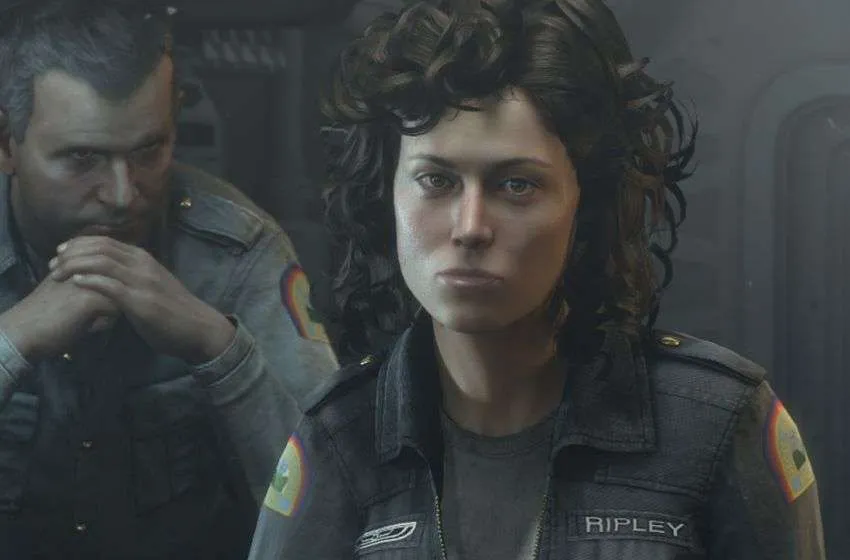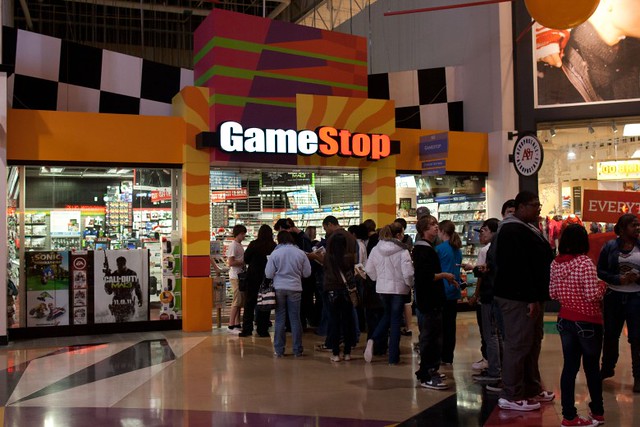
I remember the first time you could get something special by “pre-ordering” a video game.
Anyone that reserved a copy of Legend of Zelda: Ocarina of Time for the Nintendo 64 before it launched in 1998 received a special gold-colored “Collector’s Edition” cartridge, with a shiny gold box. To this day, the gold carts are still quite valuable and highly sought after by collectors.
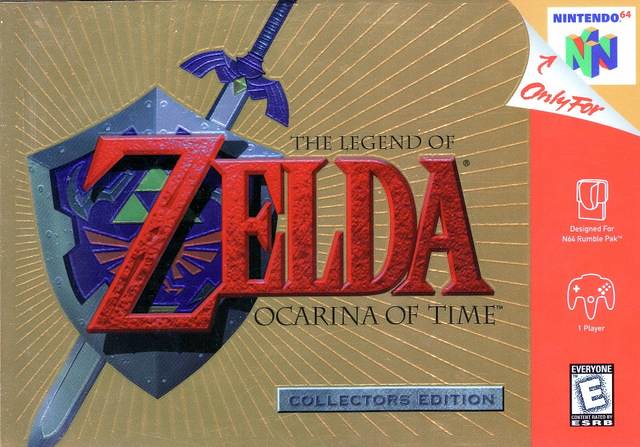
I could be wrong, but I believe Ocarina of Time may have been the very first game you could pre-order from GameStop. Pre-ordering wasn’t common in the 90′s, so obtaining one of the fancy gold cartridges required prior knowledge of the special promotion. I was one of the lucky kids who was aware of the pre-order bonus (I read a lot of Nintendo Power, GamePro and EGM). Knowing that my parents planned to buy it for me when it released, I convinced them that it would be smart to reserve my copy ahead of time.
I can recall my parents asking why it was necessary to pay in advance to secure a copy of a video game. I explained that Zelda was guaranteed to be the hottest new release of the year, so finding a copy might not be very easy. They eventually agreed, and it was only a matter of time before I finally opened the box containing my shiny gold cartridge.
Owning the special gold edition of Ocarina of Time was like a badge of honor, especially when friends saw the game sitting in my N64 and remarked about their plain, gray-colored copies. It almost literally kills me to admit that I did not hold onto the game, eventually trading it for about $70 in credit at GameStop. Alas, I am getting off track.
— — — — —
Since 1998, the practice of pre-ordering games has clearly snowballed from reserving a special copy of the most anticipated release of the year to the chaotic mess that we see today.
Unfortunately the incentive for consumers to pre-order their games has shifted far from merely ensuring a copy on launch day – or launch night, as midnight launches for blockbuster games have become commonplace over the past decade.
Almost any video game can now be pre-ordered, and not just at GameStop. All the major retail chains have latched onto the idea, including Target, Walmart, Amazon and Best Buy. You can sometimes ‘reserve’ your copy of games that do not even have a release date.
The idea of “reserving” your copy of a new game was only the beginning, as developers, publishers and retailers began pushing consumers with additional incentives.
Before long, dedicated gamers could pre-order special collector’s editions with all kinds of bonus goodies, usually for an extra $5 or $10 added to the purchase price. These perks were generally insignificant bonuses like alternate box art and special collector’s cases, collectible figurines, soundtrack CDs and concept art books. It was only a matter of time before there were multiple collector’s editions for the same games, with some boxed sets breaching the $100 price point.
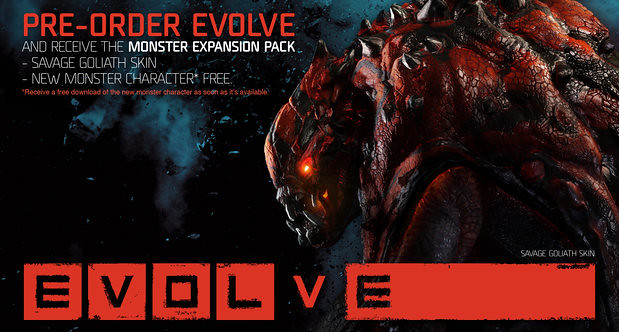
Within the past few years, different retailers have started offering their customers exclusive pre-order bonuses for “AAA” titles, like exclusive skins for weapons and multiplayer characters. Unfortunately this snowball effect has resulted in exclusive in-game content that is completely unavailable in the same game purchased from a different store or on a different platform. Even more obnoxious and offensive is the fact that all of this exclusive content can only be downloaded once, serving as a kick in the groin to anyone looking to buy pre-owned games.
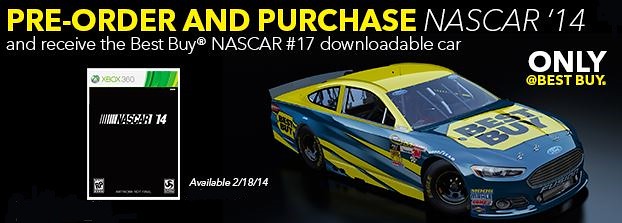
— — — — —
The issue of video game pre-orders has been hotly debated for several years now, along with similar arguments about the value of downloadable content (DLC). The discussion seems to have flared up again as GameStop’s plans to extend its reach to game development have recently been exposed.
To be more specific, the video game retailer is exploring ways to work with developers and publishers to offer even more substantial and exclusive content in new games. It has become such common practice that a new announcement was made on pre-order exclusive content just as I was writing this article.

The idea is that such content would only be available to customers that pre-order their games at GameStop.
I am not sure if that immediately reads as terribly to you as it did to me. I will say that I cannot recall any headline that has been more disturbing or unlikable in all the years of reading about and personally dealing with GameStop’s shady shenanigans, both as a customer and a former employee. This is an achievement of sorts, considering how the retailer has consistently been voted one of the most hated corporations in America.
Granted, there has been nothing officially detailed or stated about any such GameStop-exclusive content in upcoming games.
There may not be any need to hit the panic button. Regardless, this topic is one that consumers absolutely need to be aware of. As far as I am concerned, every gamer should be as disgusted and appalled as I am – never mind developers who undoubtedly take immense pride in their work.
Personally, I never had much of a problem with pre-ordering copies of games that I intended to purchase anyway. In fact, I would estimate that I pre-order roughly 80% of the games that I end up buying, especially handheld games, as they tend to be harder to find shortly after launch.
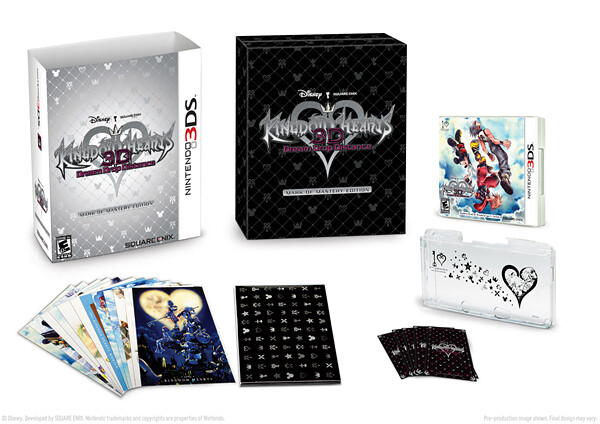
I have admittedly enjoyed receiving bonus gifts included with certain reserved games, with one highlight being the GameCube’s Legend of Zelda Collector’s Edition disc that came with pre-orders for Wind Waker. I tend to avoid most of the pricey “collector’s edition” box sets, and I prefer bonuses such as posters, soundtrack CDs and art books over exclusive weapon skins and multiplayer maps.
That being said, I am a reasonable man – so let me be totally fair as I explain why it would be a nightmare for everyone involved if GameStop pursues the development of game-changing, retailer-exclusive pre-order content:
— — — — —
1. Polarizing consumers with exclusive content makes it even harder for game designers, developers and publishers to deliver the same experience to different players.
In general, the idea of exclusive content poses a problem for developers striving to deliver the same game to players with different consoles. It is already bad enough that there are sometimes exclusive pre-order perks at different stores, often for the same title on multiple platforms.
The impact of exclusive content can be surprising in many ways, sometimes benefiting one version of a title over another. For example, Soul Calibur II featured cameos from Heihachi, Link and Spawn that were specific to the PS2, GameCube and Xbox versions, respectively. The three versions were only marginally different aside from the one bonus character, but that was enough of a difference to make an impact. Anyone that owned more than one of the supported consoles likely made their purchasing decision based on the bonus character they liked the most. I certainly did – I despised the GameCube controller for most fighting games, but dealt with it just to play as Link. Any other time I would have chosen to play a fighting game on the Xbox or PS2, but Link was the factor.
This is a pretty harmless example of a purchasing decision that was driven by exclusive content, especially compared to what could potentially happen if retail giants like GameStop, Amazon or Best Buy end up with power over the development and design process. You see, Soul Calibur II may have been slightly different on each available platform, but even those versions were the same regardless of whether or not you reserved a copy of the game before you bought it. The content out of the box was always the same. Anyone that picked up SCII shortly after launch (or even a pre-owned copy years down the road) could have enjoyed an identical experience as those who reserved it. Even today, the value of the exclusive content on each version remains, and makes each one unique.
What if “exclusive GameStop pre-order content” eventually stretches to include story-related stages, or entire scenes within the plot of certain games? GameStop could potentially work with developers to design levels or scenes that could only be accessed by pre-ordered copies, specifically from GameStop. Imagine how this could throw off the progression of the story, or leave out important details for players who chose to pick up their copy of the same game at a different store. I feel like this inconsistency is something the creative minds behind most games prefer to avoid with their final product.
2. Getting involved in game development essentially puts another grabby hand in a crowded cookie jar.
I have never been personally involved with creating a video game, but if I have ever learned anything from years of studying the industry, the process is anything but simple. It requires a lot of coordinated effort, creativity and organization, especially as the number of people involved in development increases.
There are plenty of challenges that face development studios from the birth of an idea to the launch of a new game. It is my understanding that publishers are one of those major challenges. From the funding of projects to the marketing that helps any title succeed, publishers are a major factor in the process. There are often conflicts between designers and the bigwig publishers, and creative conflicts are definitely common.
Admittedly, this is another strange example, but third-party intervention was a major factor in the design of Gran Turismo. In addition to developer Polyphony’s reluctance to show damage to the realistic car models featured throughout the series, many of the various manufacturers themselves did not support the idea of their cars being represented in any way that looked damaged or beaten up. This was hardly a game-breaking issue, but it certainly limited the suspension of disbelief for later installments that were otherwise photo-realistic.
Imagine how much the difficulty of the multi-step game design process would be multiplied if an additional party was somehow involved in development – especially retailers, with their own agenda for maximizing sales and drawing consumers. The challenge of maintaining the original creative vision for any game is difficult with more people involved. Adding GameStop to the credits only sounds like a recipe for disaster.
3. Restricting access of special content with store-specific pre-orders merely punishes oblivious consumers and could limit both the long-term sales and value of certain games.
As I have hinted throughout this editorial, an important part of pre-ordering video games involves being somewhat savvy with release dates. This generally requires a certain amount of reading online, or at least heading down to the local GameStop to check out the giant book of upcoming release SKUs. Unfortunately, GameStop’s list of release dates is consistently inaccurate. I spot two or three errors every single time I visit the store. I understand it is usually because the company’s giant list is infrequently updated, but that list serves as the only source of upcoming release dates for some gamers. This may benefit sites like this one, who inform the public of release dates, but it makes the life of average consumers more difficult.
Here is what I am getting at: if you are even slightly uninformed or completely oblivious to the monthly release schedule (or there are any other factors that limit your access to high-speed Internet, such as being in a rural area), you are already at a huge disadvantage when thinking about pre-orders and special downloads. Either you would need to spend a lot more time studying up so that you could pre-order your games in time, or just plan on missing out on all the “exclusive GameStop pre-order content”. Again, this means that you are not capable of enjoying the same experience as someone who paid the same price for the same product.
4. Driving marketing patterns toward pre-order content limits the longevity of a game’s social and financial value.
Perhaps my biggest problem with the entire concept of “exclusive pre-order content” is that it puts such an increased emphasis on the immediacy of buying and playing on launch day. Like so many other parts of entertainment, video games have become increasingly digestible over the past few years.
It takes something truly special to stick around for more than a couple of months, and something groundbreaking to last more than a year or two. There are plenty of absolutely brilliant modern titles that can (and will) stand the test of time, but it is hard to deny that newer games get chewed up and spit out just as quickly as anything else in the media.
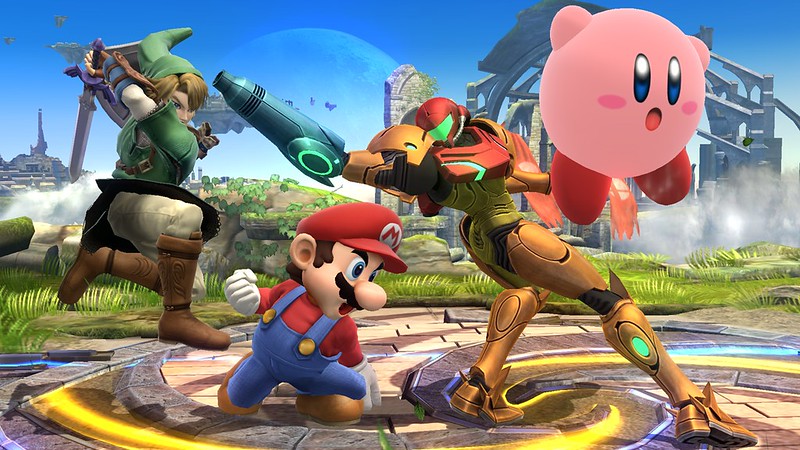
If it is GameStop’s intention to create content that is exclusively available to those who pre-order their games, the retailer (and any cooperating developers) immediately isolate the creative reach of the intended experience by cutting out a huge portion of the audience. Players that don’t purchase games on day one, consumers who prefer pre-owned games, less-dedicated players that may not even know that they are interested in picking up the game until seeing reviews…the list goes on.
At this point it might sound like I am completely against the idea of pre-ordering video games, but that definitely isn’t the case.
As I stated earlier in this article, I generally pre-order any game that I plan to purchase. The reason for this is usually because I like to avoid any hassle with securing my own copy as close to launch as possible.
For some games, particularly Nintendo 3DS titles, finding a copy can be difficult – it is hardly a secret that Nintendo has tried to focus more on digital downloads, and has limited the number of extra copies shipped to retailers. This specifically made it hard for me to find my copy of Fire Emblem: Awakening, especially because I never pre-ordered it.
I rarely care much for pre-order bonuses. I can honestly say I have never chosen to pre-order my games from Best Buy or Amazon rather than GameStop due to any exclusive bonus content. On the other hand, I have admittedly made the effort to pre-order games many times in the past for the little perks, especially concept art books, posters and soundtrack CDs. To say that I am not at least slightly enticed by exclusive content is inaccurate.
If GameStop proceeds with exclusive pre-order content such as what has been discussed above, I will certainly be disappointed – I think that gamers are the ones that will really miss out, and I cannot see a lot of ways that the involvement of retailers in game development could benefit publishers or development studios.
GameStop certainly should find ways to give its consumers incentives for pre-ordering their games at GameStop stores. If the used game market continues to dry up for the company, its focus will need to shift to other ways to make profits. Creating new content is definitely an interesting way to do that, but if it comes at the cost of alienating players from the same experience, I do not think it is worth the effort.
Perhaps an alternate strategy could involve more of what has been done in the past, like exclusive skins for in-game characters, special game modes or multiplayer maps, bonus posters and art books. One of my favorite pre-order incentives was the messenger bag from Mirror’s Edge, which was handed out to anyone that reserved a copy at GameStop. The bag not only looked cool, it broke the fourth wall and brought something from the game into the real world.
It might sound like a crazy idea, but GameStop could even provide customers with in-store credit vouchers, even codes for extra Xbox Live subscription time or eShop/PlayStation Network credit – maybe discounted strategy guides or other related merchandise.
Ultimately it is most important for the creative development of video games to be placed solely in the hands of the designers, without a lot of external pressure. It is true that GameStop will eventually need to find a way to direct its primary source of profits to new game sales, but the idea of creating exclusive content in new video games is a terrible way to go about it. I also think it is very important that players enjoy the same experience as others – making that more difficult for the average consumer benefits no one — except GameStop — and even then, ruining users’ experiences is not a smart long-term business strategy.
